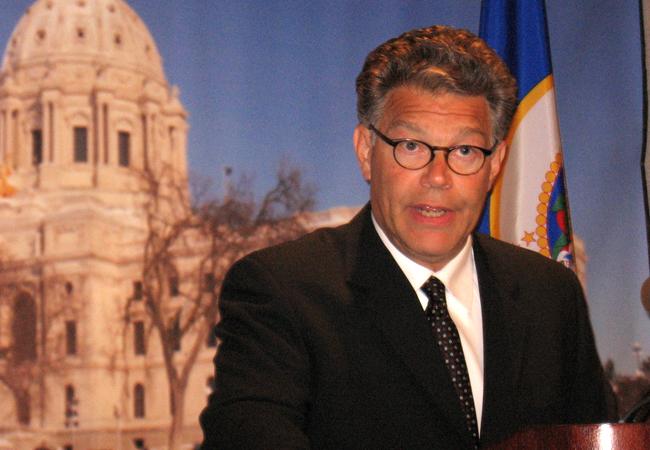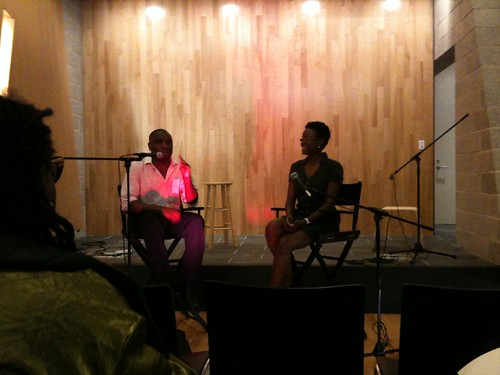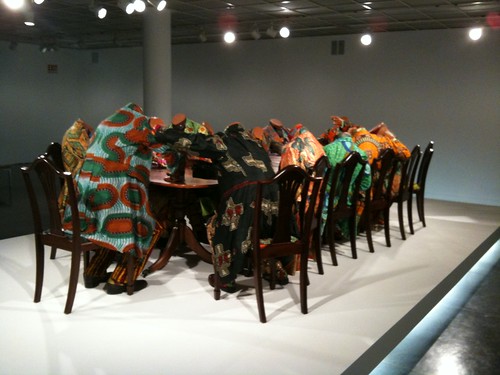###
 Shortly after I'd posted my Michael Jackson note, I realized that in my class this past winter, we or I might have--I use the past conditional because, truthfully, I only hazily recall the reference, which might have been a blip in a conversation but was definitely not part of the syllabus--broached him in relation to one of the course's topics, "transhumanism/posthumanism." I think the reference arose based on his successive physical and aesthetic transformations. We did look specifically at a figure like Stelarc, but we also touched upon both self-proclaimed artists like Orlan, and non-artists who could be discussed as such, like Jocelyn Wildenstein. Now that I think about Jackson, I realize that I probably could have developed a complete little module about him in relation to the larger topic, as the surgeries, his own narratives about exceeding or surpassing the human, the use of various analog and digital technologies, and so on, would place him well within aesthetic discussions that range from the earliest examples of this notion (the use of early sound technologies, say, or prostheses) to transgenesis, advanced and digitized prosthesis, and so on. Of course I'm hardly the only one who's thought of him in this way, but the idea of the transhuman makes me wonder about what it might mean in a larger sense to think of Michael Jackson in relation to transhumanism and the posthuman? How does that check the impulse to critique in psychological and moral about his skin-lightening and feature-thinning regime, his approach to parenting, his sometimes technologically advanced sleeping arrangements? Is it possible to talk about this approach to his life--as opposed, say, to his art--without shutting down or off other avenues (think negative capability)? Was he the first great black transhumanist/posthumanist artist, or would others (Sun Ra, for example) qualify? R. Sirius, in his provocative h+ article, suggests that Jackson is someone whose example should be avoided, but he also goes on to make an array of points about how to relate Jackson to a conceptual program in which he's usually not overtly linked. What do you think?
Shortly after I'd posted my Michael Jackson note, I realized that in my class this past winter, we or I might have--I use the past conditional because, truthfully, I only hazily recall the reference, which might have been a blip in a conversation but was definitely not part of the syllabus--broached him in relation to one of the course's topics, "transhumanism/posthumanism." I think the reference arose based on his successive physical and aesthetic transformations. We did look specifically at a figure like Stelarc, but we also touched upon both self-proclaimed artists like Orlan, and non-artists who could be discussed as such, like Jocelyn Wildenstein. Now that I think about Jackson, I realize that I probably could have developed a complete little module about him in relation to the larger topic, as the surgeries, his own narratives about exceeding or surpassing the human, the use of various analog and digital technologies, and so on, would place him well within aesthetic discussions that range from the earliest examples of this notion (the use of early sound technologies, say, or prostheses) to transgenesis, advanced and digitized prosthesis, and so on. Of course I'm hardly the only one who's thought of him in this way, but the idea of the transhuman makes me wonder about what it might mean in a larger sense to think of Michael Jackson in relation to transhumanism and the posthuman? How does that check the impulse to critique in psychological and moral about his skin-lightening and feature-thinning regime, his approach to parenting, his sometimes technologically advanced sleeping arrangements? Is it possible to talk about this approach to his life--as opposed, say, to his art--without shutting down or off other avenues (think negative capability)? Was he the first great black transhumanist/posthumanist artist, or would others (Sun Ra, for example) qualify? R. Sirius, in his provocative h+ article, suggests that Jackson is someone whose example should be avoided, but he also goes on to make an array of points about how to relate Jackson to a conceptual program in which he's usually not overtly linked. What do you think?Of course there is also the possibility to consider Jackson's strangeness--which Rev. Al Sharpton, in his eulogy, deflected back onto Jackson's critics and questioners, somewhat unfairly I think, given how strange Jackson truly was and is (he was!)--in relation to conceptual art itself. One of the first things I suggested to my class was that we might think of our sitting in that classroom as a conceptual art project and could legitimately claim our performances and experiences as such if we--or someone else--properly framed it as such. They grasped this pretty quickly, but held it lightly, because of course they had to do lots of reading, participate in class conversations, and write papers, and unlike participants in a conceptual project, they couldn't just walk out and not expect some direct effect on their grade. (Though I also always take to heart Gertrude Stein's [in]famous response to a test in William James's class, so....) But what if we think about Michael Jackson's life, in all its rich strangeness, as a conceptual project, endlessly unfolding (still, after his death--remember he is posthuman), one that he might have been aware of, perhaps not in the ways that conceptual practices have been developed since George Brecht, Allen Kaprow, and others in the late 1950s, but more broadly in light of such proto-conceptual theorists and practioners, people who did argue for and in several cases transform their lives into works or art, or at least break down the barrier between them to a striking degree, like Walter Pater, Oscar Wilde, Friedrich Nietzsche, Claude Cahun, Marcel Duchamp, and John Cage, and situate some of the at-times disturbing aspects--Wacko Jacko!--in light of this constellatory perspective? We can start, say, with that chimpanzee....
A third perspective I thought of, particularly after reading a gossipy piece in one of the British tabloids--The Sun? The Mirror?--which purported to out Jackson (he had several gay male longterm boyfriends/lovers, etc.), was of Jackson as a queer icon. I'm thinking of queerness in its array of meanings, in regard to issues of orientation, identity, sexuality, gender--and I know I wasn't the only person who thought that Jackson had remade himself at various points into Diana Ross (as Dorothy, with that fro), then, at least facially, into the young Elizabeth Taylor, and then, as one of the late 1990s mugshots appeared to suggest, and perhaps not purposefully, into something on the order of Faye Dunaway in Mommy Dearest, among others--family, another way of reading that "strange" that Sharpton evoked, or "funny," as people might say, meaning in relation to normalized social categories more generally, "queer" might be another way of thinking about him and how he moved through the world. More than anything, his ways of living challenged all sorts of norms of American and African American middle-class respectability, which led to considerable criticism (no, we didn't always love him, well, not all of us, no matter what people are saying now.) I'm also thinking of the arguments advanced a few years ago by scholars like Leo Bersani, Lee Edelman, Judith Halberstam, and, in a different way, by José Estéban Muñoz and Tim Dean, regarding queer antisocialities and approaches to hetero and increasingly homonormativities. If we expand the notions of the queer family (as my mother said to me tonight about Joe Jackson, "those are not his biological grandchildren!"), wouldn't his creative and ever-shifting family unit, as well as the paternity of and his behavior with his 3 children be less grist for some of the tut-tutting that has occurred? (Then there's the gaggle of children he had living with and visiting him at Neverland and elsewhere, though I am not, however, talking about the pedophilic allegations.) What about his (re-)conceptualizations of home, which sometimes ranged to the highly inventive? And on and on. One thought I had was, would thinking about Michael through a queer lens be yet another step towards normalizing away the queerness that made MJ often so compelling, iconic and singular? How far should the normalizing power of queerly reorienting one's perspective go, for him or anyone else?
###
Last night Rachel Maddow had Pat Buchanan on her MSNBC show. As I noted a day ago, in response to Judge Sonia Sotomayor's nomination Buchanan has been particularly toxic. Last night he didn't disappoint, spewing rhetoric that would not have been out of place at a Klan rally. Across the web I've seen a good deal of praise for Maddow's response, and I do agree that she held her own under the circumstances. Yet the fact that this very smart woman wasn't able to marshal even a few general historical facts to counter Buchanan's assertion that "this country was built up by white people" dismayed me. I mean, come on. Whether we're talking about Buchanan's native city (Washington, DC), the city in which MSNBC is headquartered (New York), or great swathes of this country, but people of every ethnicity have "built" this country, in the physical, economic, political, and social senses. At the very least, she could have just blurted out, what about the enslaved people or the black folks and the native americans and been on solid ground. Yet she didn't counter this assertion directly, at least not at first. It was a crazy assertion, and probably as blatantly white supremacist as I've heard Buchanan utter, though he did vomit out a kleaglish stream during the segment (see for yourself below), much of it right-wing myths and canards that have been dispelled a while ago. Maddow found her voice soon enough, and challenged Buchanan on various grounds, while also politely suggesting that he perhaps didn't "mean" what he was saying, an ironic gesture I know since nyone watching, as well as both Maddow and Buchanan themselves, knew exactly what he was saying. Perhaps she was letting him know, in the nicest manner possible, that he wouldn't be coming back on her show. Some people across the net have said that they want him to hang around as the public face of the GOP, but with Palin, Limbaugh, Beck, Gingrich, Giuliani, Romney, Fox News, and the unending string of hypocritical adulterers on the scene, I seriously think we can do without Buchanan. He and his sister Bay can go fulminate, or bay, at their racial demons somewhere far, far away from any TV cameras. Seriously.
Visit msnbc.com for Breaking News, World News, and News about the Economy
###
I was very glad to see the US Senate Democratic caucus successfully attach S. 909, the Leahy/Collins/Kennedy/Snowe hate crimes amendment (The Matthew Shepard Hate Crimes Prevention Act) to S. 1390, the FY 2010 Department of Defense Authorization bill last night, meaning that it has a very good chance to become federal law. Will President Obama, who has stumbled badly on LGBTQ issues since taking office and who said he opposes the F-22 provisions of the defense appropriations to the extent that he's threatened a veto, nevertheless do the right thing sign it into law?

 Today
Today 











